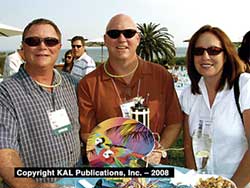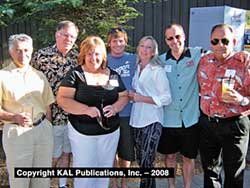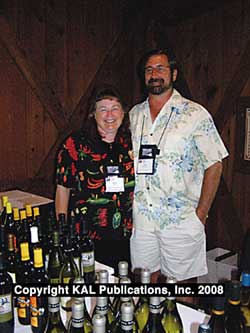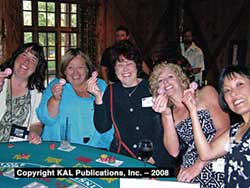
September 2008 Issue Highlights
For more complete coverage, send us an e-mail to
request a back issue.

For more complete coverage, send us an e-mail to
request a back issue.

California Petroleum Conference

Northwest Pump CustomerAppreciation BBQ


Oregon Petroleum Association Convention
Want to see the photos that didn't make the issue? Check out the Cutting Room Floor.
Hawaii Defeats "Gas Guzzler" Fines
UNEV Buys Utah Pipeline, Terminal
Exxon To Quit Marketing In Oregon, Washington
California Increases Tax on Flavored Malt Beverages
Oregon Allows Same-Day Beer And Wine Home Delivery
Driver Crashes Into Convenience Store To Buy
Beer
HONOLULU, HI. — Two bills, proposed by members of the Hawaii Legislature in an attempt to discourage drivers from purchasing "gas guzzlers," have been defeated as anti-consumer.
The first bill would have established a progressive purchase surcharge for some new motor vehicles based on state calculations of carbon emissions.ÊUnder the terms of H.B. 2102, the state of Hawaii would "establish a market-based clean vehicle incentive program consisting of one-time rebates and one-time surcharges on the purchase of motor vehicles." State officials would calculate which vehicles were considered to have high emissions or too inefficient and levy a carbon surcharge against those drivers when they purchased their car. The carbon surcharge could require owners to pay up to $2,500 more for their vehicle.
Drivers leasing a vehicle would also be charged the carbon tax at a rate as if they had purchased the vehicle.
Drivers who bought cars that the state considered to be low emitters and efficient could apply for a rebate after purchasing their car. The rebates would be funded by the fines levied against the less efficient vehicle drivers. The maximum rebate would be capped at $2,250 per vehicle. The rebates would be awarded after the state covered its administrative costs and set up a reserve account equal to 15 percent of estimated rebates.
The second bill would have established a progressive fee for state motor vehicles based on engine size. These fees would be collected by the state at the time of initial vehicle registration and at subsequent renewals of registration. These fees would be in addition to fees and taxes normally required for registration or renewal.
CEDAR CITY, UT. — UNEV Pipeline LLC has purchased Musket Corp.'s products terminal and rail facilities here for $9.8 million.
UNEV Pipeline is 75 percent owned by Holly Corp. and 25 percent owned by Sinclair Transportation Co.
UNEV says they plan to build a new terminal facility next to the Musket Corp. terminal and add an additional pipeline to provide products to southwestern Utah.
The company says that the pipe for the new 406-mile, 12-inch UNEV pipeline has been delivered and is being staged along the pipeline right-of-way as indicated in their permitting with the Bureau of Land Management. A record of decision is expected from the agency in early 2009 to proceed with the new pipeline; once the approval is received, UNEV plans to immediately begin construction and seek to complete the project within one year.
In the meantime, the former Musket Corp. terminal is being operated by Holly Energy Partners-Operating L.P.
IRVING, TX. — Exxon has announced that they will withdraw their brand from western Washington and Oregon, effective as of Jan. 29, 2009.
Exxon held a market share of approximately three percent in the Northwest region. Because of the low share, Exxon spokesman Beth Snyder said the company "doesn't expect a noticeable impact on consumers in the region."
The announcement to drop the brand in the Pacific Northwest comes on the heels of Exxon's decision to sell all of its company-owned stations in the United States to jobbers. Approximately 820 company-owned stations and 1,400 dealer stations will be divested, primarily in the East and Southeast.
"As the highly competitive fuels marketing business in the U.S. continues to evolve, we believe this transition is the best way for ExxonMobil to compete and grow in the future," said Ben Soraci, Exxon's U.S. director of retail sales in a message to marketers. "Quality, dependable Exxon and Mobil branded fuels will continue to be part of the branded distributor offer."
As for leaving the Pacific Northwest, Snyder said that the company is "committed to a smooth transition with our customers, dealers and distributors."
SACRAMENTO, CA. — California has enacted a new regulation that will tax sales of flavored malt beverages as if they were distilled spirits rather than beer under new rules that take effect this Fall.
Affected by the regulation are alternative beverages such as Smirnoff Ice and Barcardi Silver which are popular among convenience store customers.
Under the new regulation, all non-wine alcoholic beverages, including flavored malt beverages, must prove their product does not meet a new definition of "a distilled spirit" to avoid the higher tax rates.
The tax rate change means that flavored malt beverages will be taxed at the distilled spirits rate of $3.30 per gallon, rather than the rate of 20 cents per gallon for beer which they had been paying as a malted beverage. The new tax rate is expected to raise the beverage price substantially to customers.
The decision to increase the tax rate was made by the California Board of Equalization which had been conducting a two-year policy review on the malt beverages and their tax rate.
Last November, California's Department of Alcoholic Beverage Control said the Board of Equalization should not reclassify the malted beverages, saying state law is ambiguous and that legislators ought to approve any new tax changes. The BOE decided to ignore this recommendation and proceed with the new taxation.
Board of Equalization spokeswoman Anita Gore estimated the tax increase will generated an additional $41.4 million for the state annually.
"Decisions about raising taxes on flavored beer are the responsibility of the Legislature, not three politicians on the Board of Equalization," said Amy Elliott, a Sacramento-based state government affairs director for Diageo PLC., the manufacturer of Smirnoff Ice and other malted beverages. Elliott said that Diageo is planning to sue the state to have the new tax overturned.
The new tax rate will become effective in California in October.
SALEM, OR. — Oregonians can have grocers make same-day deliveries of unlimited amounts of beer and wine to their homes, under a new rule announced by the Oregon Liquor Control Commission decided.
Until this year, the only businesses that could make home deliveries of alcoholic beverages were those serving meals, notably pizza restaurants. Grocers were only allowed to deliver beer and wine ordered the previous day.
Under the new rule, unlimited beer and wine orders must be placed by 9 a.m. and delivered by 9 p.m. the same day. Amounts over a five-gallon, two-case limit will be allowed until 4 p.m. as long as the alcohol makes up no more than 25 percent of the total order's cost.
The person receiving the beer and wine delivery must show identification proving they are over age 21 and sign for the delivery.
The change in the delivery rules had been requested by grocery store chain Safeway. The grocery store's lobbyist, Dan Floyd, said that the chain had been making limited amounts of same-day beer and wine deliveries since January; the only change is the amount of beer and wine the company is allowed to deliver. Floyd also noted that the chain doesn't make beer or wine deliveries to people who are visibly intoxicated or aren't age 21 or older.
Oregon law does not allow home deliveries of hard liquor, which is only available from the 240 state-operated liquor stores.
NORWALK, CA. — Joe's Food Mart and Video, a convenience store located here, temporarily became a drive-thru in July when a 74-year-old woman drove through the front window and then tried to buy a six-pack of Budweiser.
According to local police reports, Lynne Rice of Norwalk drove her 1988 Cadillac halfway into the store on a Sunday evening. The driver then got out of the car, walked over to the beer cooler, pulled out a six-pack of Budweiser, and then brought it to the counter. The cashier declined the sale and called the police.
No one was injured in the incident; damages to the store were estimated at approximately $8,000.
Rice was was taken to a local hospital for examination and was arrested for investigation of misdemeanor driving under the influence. She was released on $15,000 bail.
Originally published in the September 2008 issue of O&A Marketing News.
Copyright 2008 by KAL Publications Inc.
Serving the 13 Western States, the World's Largest Gasoline, Oil, Fuel, TBA and Automotive Service Market